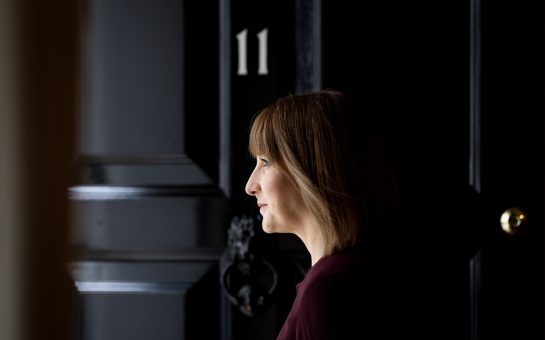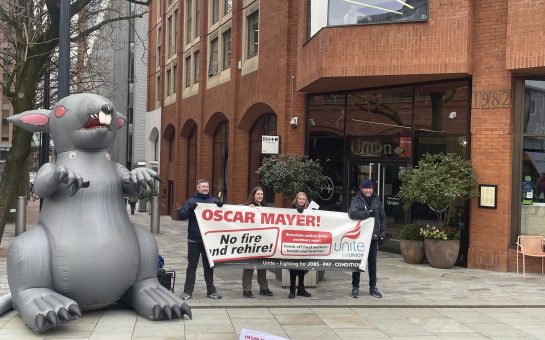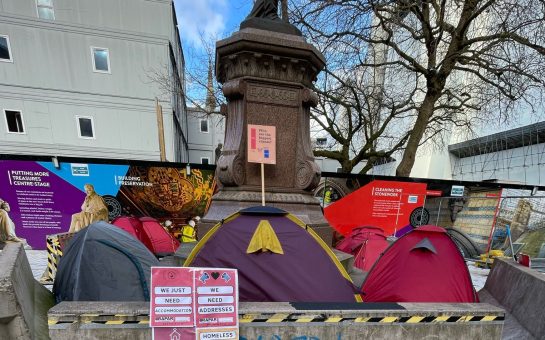The Manchester Mayoral Election is just three months’ away, and the issues on Mancunians’ minds are more pertinent than ever.
MM spoke to the Mayor of Greater Manchester, Andy Burnham, about homelessness, poverty and policing.
When Andy Burnham became Mayor of Greater Manchester in 2017, tackling homelessness was a top priority for him. He has continuously donated 15% of his salary to homelessness charities, and he is looking to ‘ramp up’ efforts to reduce it further upon re-election.
“We’ve made, I think, fairly dramatic progress in that we have an infrastructure now to support people that we didn’t have four years ago,” Burnham said.
“A Bed Every Night is the flagship scheme I brought forward.
“Tonight, for instance, 520 people will be in a Bed Every Night.
“We had the numbers down to double figures last year, particularly when the pandemic started and the government launched the Everyone In initiative.”
Burnham acknowledges reducing the number of rough sleepers is a challenge, but thinks that a ‘Good Landlord Charter’ would go a long way to reducing homelessness.
This would involve landlords registering to a localised charter, to prevent ‘no fault’ evictions and ensure properties meet health and safety standards.
Evictions from private rented accommodation remain the biggest cause of homelessness.
Issues like homelessness and poverty have seemed even more stark during the COVID-19 Pandemic, as Burnham observes that people seem to have been living parallel lives – with some staying at home and others having to go out to work.
“It can’t be ignored that the death rate has been twice as high in the north of England as in parts of the south.
“So these issues will be at the forefront of this mayoral election.”
It’s this divide which spurred Burnham to advocate for the next stage of vaccinations to focus on areas with lower-than-average life expectancies.
He said: “In those poorer communities, more people have been out at work as a taxi driver or in a supermarket, I think there’s a very strong case for those people to be vaccinated more quickly.
“I’m not talking about a complete departure from the set of priorities the government has outlined.
“I’m just saying that if we surge supplies into areas with the lowest life expectancy, we can probably save more lives.”
Like his Conservative and Liberal Democrat opponents, Burnham thinks of his approach to alleviating poverty as a ‘hand up’, pointing to free bus passes for sixteen to eighteen-year-olds as an example of this.
“I don’t think there should be any limit on our young people.
“If you live in one of the boroughs surrounding the city centre, you might not feel like you can go there.
“It’s about connecting them to opportunities, and free bus passes are sending the message that we believe in them.
“Young people, who probably have the toughest sorts of environments at home, are getting the most benefit from it.”
A notable event in Burnham’s term as mayor came late last year, when he had a dispute with the central government over the tier system.
Greater Manchester was placed into Tier 3 with only a 67% furlough scheme in place to support workers.
“I felt I would have been failing in my duty to the Greater Manchester public, if I hadn’t taken a stand” Burnham said.
“And I think it was subsequently justified by what happened – they had to reestablish a self employment support scheme, they had to start paying compensation to areas under Tier Two restrictions.”
The fact that London – which entered Tier 2 shortly after – was treated differently was objectionable to Burnham: “London went into Tier 2 and they got a financial package.
“I don’t think the people would allow the Mayor to let us be walked all over.”
Greater Manchester Police is another area where central government decisions have had a massive impact – heavy spending cuts since 2010 meant a loss of 2,000 frontline officers by the time Burnham entered office in 2017.
Burnham’s first budget in 2018 addressed the issue of police figures, by putting funding towards recruitment – before the central government’s recent push to bring more police back onto the streets.
“As of today, there are around 670 extra police officers compared to 2010.
“And we’re planning to recruit 325 more in the next financial year.
“By the end of 2021-22, we will have brought back 1,000 of the 2,000 that we lost.”
He also plans to boost public confidence in the police through a Named Officer Plan, through which a named contactable police officer and police community support officer for every resident in Greater Manchester.
This was launched in January, and allows residents to directly contact their local officers through the Greater Manchester Police website.
Burnham said: “It’s about transparency, in showing you where the resources are.
“But it’s also about accountability.
“This reform intends to deliver a more accountable police force.
“And it’s been made possible by the fact that we’ve increased police numbers over the last few years.”
On a topic that is currently being debated – whether the Labour Party should embrace patriotism – Burnham is clear on his opinion: “I’m a patriotic person.
“I don’t need to sit with a Union Jack behind me to prove that.
“I go towards British patriotism rather than English patriotism, because I’m a passionate believer in unions and the union of the four nations – Wales, Scotland, England and Northern Ireland.”
Burnham argues that patriotism should go far beyond flags and platitudes: “The older I’ve gotten, the more I’m interested in deeds, not words, as the old Suffragette motto said.
“I would rather prove it by never having somebody who served this country in the armed forces sleeping rough on our streets. That proves to me a patriotism of the right values.”
The Manchester Mayoral election will take place on May 6th 2021.



